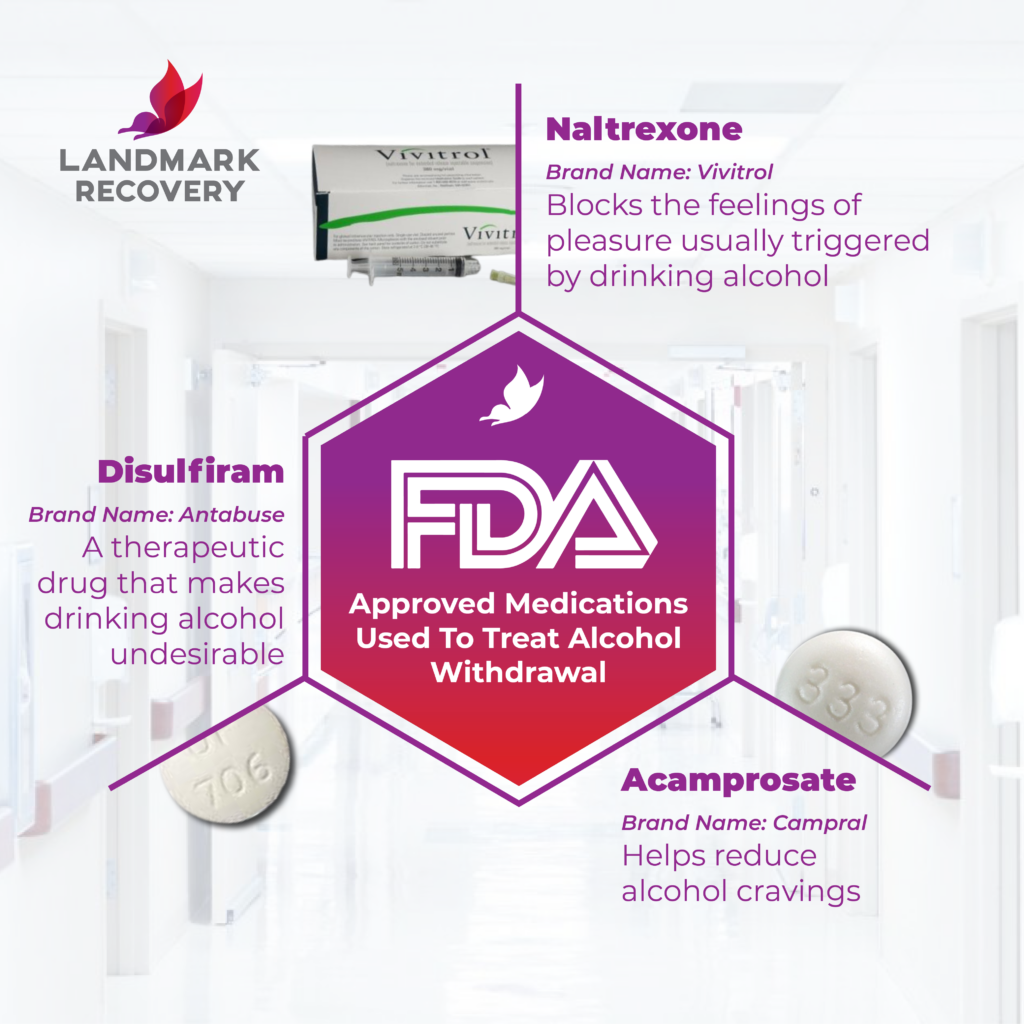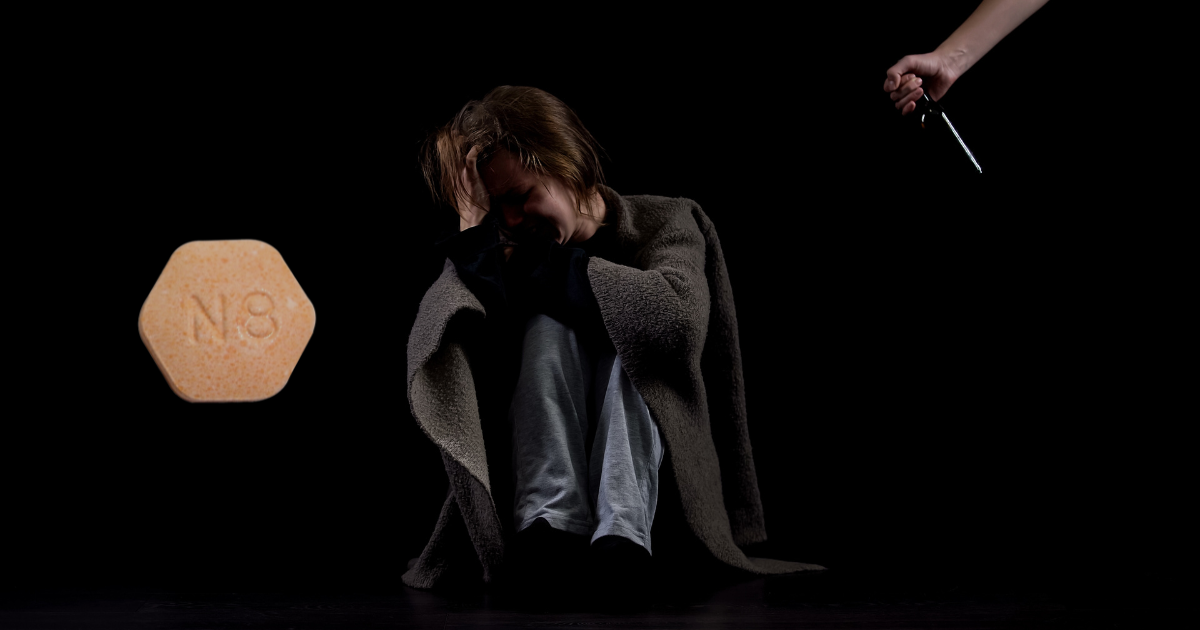Research has found that Suboxone—a medication often used to treat opioid addiction—can help with alcohol withdrawal symptoms. This finding offers hope for those in recovery, as Suboxone may ease discomfort and reduce alcohol cravings. But before we cover the specifics, let’s clarify some important terms.
Key points in this blog:
- Suboxone, typically used for opioid addiction, may also ease alcohol withdrawal.
- Alcohol use disorder (AUD) is an illness causing uncontrolled drinking, despite its negative impacts.
- Alcohol withdrawal can happen when heavy drinking is suddenly reduced or stopped, causing symptoms from anxiety to serious conditions like seizures.
- Medications like Naltrexone, Acamprosate, and Disulfiram can also help with alcohol withdrawal.
What is Alcohol Use Disorder (AUD)?
Alcohol use disorder (AUD) is a chronic disease where excessive drinkers struggle to control or quit alcohol, even when it has negative social, occupational, or health consequences. AUD is not a sign of weakness or a lack of willpower; it’s a medical condition that requires professional addiction treatment.
Related Story: The Cost of Alcohol Use Disorder
What Happens During Alcohol Withdrawal?
Alcohol withdrawal is a phase that can occur when a person who drinks excessively regularly suddenly quits or limits their alcohol intake. The symptoms range from mild, like anxiety and shaky hands, to severe complications, such as seizures or delirium tremens (DTs), a dangerous form of withdrawal causing confusion, fever, and rapid heartbeat.
Contact Landmark Recovery today at 888-448-0302 to speak with an admissions specialist about help with an alcohol use disorder.
What is Suboxone?
Suboxone is a medication that combines buprenorphine and naloxone, primarily designed to treat opioid addiction. Buprenorphine is a partial opioid agonist—it fills the opioid receptors in the brain, reducing cravings and withdrawal symptoms. Naloxone, an opioid antagonist, discourages substance misuse by inducing withdrawal symptoms if Suboxone is injected.
How Does Suboxone Interact with Alcohol Addiction?
Despite its primary use in opioid addiction treatment, Suboxone has potential benefits for those suffering from alcohol withdrawal. A study published in the Biological Psychiatry Journal found that buprenorphine, a key ingredient in Suboxone, can reduce alcohol consumption by activating specific receptors in the brain.
Is Suboxone the Only Treatment for Alcohol Withdrawal?
Suboxone may be part of a comprehensive alcohol withdrawal treatment, but it’s not a stand-alone solution. An integrated approach to alcohol withdrawal often includes a combination of withdrawal medication, therapy, and supportive care.
Addiction experts say the safest place to manage withdrawal is a certified alcohol detox center. These facilities offer 24/7 medical care, which is crucial during withdrawal from alcohol or opioids, as symptoms can be life-threatening. After detox, a longer stay in a residential treatment center helps people understand why they turned to alcohol in the first place and how to cope better in the future.
FDA-Approved Medications Used To Treat Alcohol Withdrawal

Naltrexone, Disulfiram, and Acamprosate are FDA-approved medications used to treat alcohol withdrawal symptoms.
In addition to Suboxone, other FDA-approved medications can help manage AUD.
- Naltrexone: Blocks the feelings of pleasure usually triggered by drinking
- Acamprosate: Helps reduce cravings
- Disulfiram: A therapeutic drug that makes drinking undesirable
How Do I Find Help for Alcohol Addiction?

Find help for alcohol use disorder at Landmark Recovery of Denver, an alcohol and drug addiction treatment center in Aurora, Colorado.
If you or someone you care about struggles with alcohol, remember you’re not alone—and help is available. Alcohol use disorder is a serious condition, and its withdrawal symptoms can be life-threatening if untreated. But recovery is possible, and treatments like Suboxone can play a role in facilitating that journey.
At Landmark Recovery, we offer comprehensive alcohol rehab and residential treatment programs tailored to fit each person’s needs. Take the first step towards recovery and call our confidential admissions line at 888-448-0302, available 24/7/365. Visit our locations page to find an alcohol detox center or an inpatient or outpatient rehab center near you.
Want to Learn More About Alcohol Addiction?
A complete understanding of alcohol use disorder is an important part of recovery. For more resources related to alcohol and addiction, read the following blogs:
Alcohol Addiction:
- How to Wean Off Alcohol – Landmark Recovery
- What is Precipitated Withdrawal?
- Can An Alcoholic Quit Cold Turkey?
- What Are The Dangers of Alcohol Seizures?
- Is It Dangerous to Mix Melatonin and Alcohol?
- Why Alcoholics Can’t Stop Drinking
- The Permanent Pain of Alcoholic Neuropathy
- When A Coworker Smells Like Alcohol
- Should You Drink Caffeine While in Recovery from Drugs or Alcohol?
Alcohol Rehab:
- How Long is Alcohol Rehab?
- What to Bring to Rehab
- How to Get Into Rehab Immediately
- Can You Have Your Phone In Rehab?

Choose Recovery Over Addiction
We're here 24/7 to help you get the care you need to live life on your terms, without drugs or alcohol. Talk to our recovery specialists today and learn about our integrated treatment programs.




